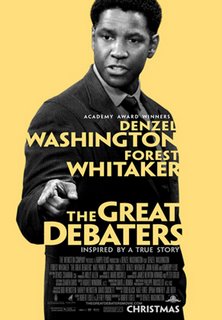
If
The Great Debaters did not entirely click with me, it's certainly not for a lack of trying. Making his second directorial effort after 2001's
Antwone Fisher, Denzel Washington certainly shows that he knows how to shoot a beautiful picture and get some wonderful performances out of his cast. The story, though somewhat overly worn and cliche, is also undeniably effective, and even moving at times. The only thing holding the film back is that despite holding a fairly generous run time of just over two hours, the story frequently seems rushed, and the characters not quite as alive as they could and should be. This is a movie filled with many wonderful scenes and moments that stick out surrounded by a bunch of scenes that either aren't developed enough, or just don't have the strength to stand out.
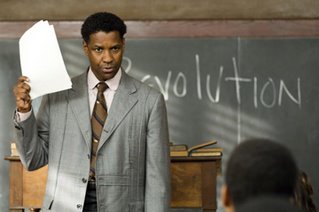
Inspired by a true story and set in the racially-charged South in 1935, the film follows a stern yet understanding college professor named Melvin Tolson (Denzel Washington) who led three of his bright young students at Wiley College into history as the first African American college debate team to compete against one of the top schools in the country. The students who broke down the borders of race include the strong-willed Samantha Booke (Jurnee Smollett), team leader Henry Lowe (Nate Parker), and the youngest student on the campus, 14-year-old James Farmer, Jr (Denzel Whitaker). As they make their way through the debate tournament mostly undefeated, the students will come face-to-face with racial prejudice, and their own personal demons, such as Henry's addiction to alcohol and women, and James feeling like he's not respected on the team due to the fact he's so much younger than everyone else. There's also talk that Professor Tolson is in trouble with the local law, and that it may jeopardize the team's future, which many people including James Farmer's father (Forest Whitaker) are concerned about. It goes without saying that the movie climaxes with a big debate tournament, as the three students go up against Harvard University in a historical match.
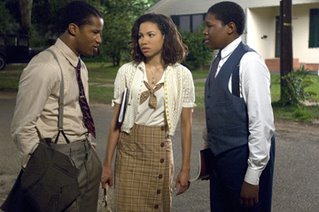
In bringing the story of the Wiley College debate team to the big screen, director Washington and screenwriter Robert Eisele have changed some major facts, most notably the fact that the historical match that concludes the film was not against Harvard but a completely different school. Nonetheless,
The Great Debaters knows what its doing when it comes to being uplifting, inspirational entertainment for the most part. All three of the young actors who play the students on the debate team handle their roles effortlessly, particularly Denzel Whitaker (no relation to actor Forest Whitaker, who plays his father) as the youngest member of the team. This is the first I've noticed him in a film, though he has already racked up some credits. As the son of a local preacher who is forced to hide his feelings for debate teammate Samantha due to the age difference between them, his character has the most emotional story arc of the main characters, and his performance is immediately likable and easy to relate to. His fellow students get their own subplots, such as the shaky relationship that slowly develops between Henry and Samantha, and Henry battling his own personal demons. However, neither of these get quite as much screen time as young Whitaker's character, and so he is able to almost single-handedly walk away with the entire film.
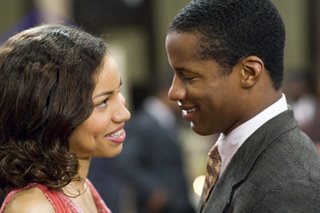
That right there leads me to my major concern with the film. The movie has been made with obvious care, holds great performances, and has a number of memorable scenes tied into the racial tensions of the time, such as when Tolson and the students come upon a lynch mob while driving late one night, or when young Whitaker and his family run afoul of some pig farmers. The memorable moments stand out, but seem strangely out of place with the rest of the movie. The reason is mainly because the rest of the movie is so pedestrian and by the book that it's hard to get excited about almost everything else that happens during the course of the film. It's not just the fact that we've seen it all before in numerous other films. The film keeps us at a continuous distance, never letting us get as close as we want to. Professor Tolson almost seems to come across as an afterthought, as he has very little interaction with the students during the course of the film, and never quite comes across as a source of inspiration like he should. The students' debate career is mostly handled with montages or off camera. One of the most frustrating and oddest choices of the film is when James Farmer, Jr nervously takes the debate stand for the first time, and supposedly leads to the team's first loss. We don't get to see this, however, which kind of seems like a cheat. It also somewhat lessens the climax, when young Farmer is forced to take the stand again.
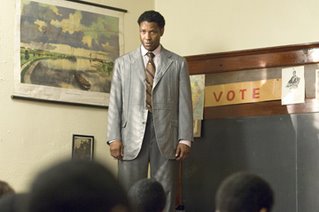
Perhaps what is more frustrating is
The Great Debaters' inability to resolve even its major story arcs. The love triangle between the three students never quite seems to get resolved to any reasonable degree. The scene we expect the characters to sit down and talk it out never comes, and the subplot really is just left hanging when the end credits appear. I find this curious, since this is a major cause of friction within the team, and to have it completely dropped is quite sloppy on the part of the screenplay. The characters seem to come together as a team at the end almost for no reason at all. Professor Tolson's subplot seems to come and go, almost like the character himself. He disappears for long periods of time as the movie decides to focus solely on the students, then comes back, almost as if to remind us he's in the movie also. There's something very wrong with an inspirational teacher movie when the teacher comes across as such a minor character. His lessons and wisdoms that he imparts to his students come scattered throughout the film, but it almost comes across as if the students did everything by themselves, and that their legendary year was the result of solely them. This is most likely because Washington wanted the movie to focus on the young actors instead of him, but at the same time, he should have given his character a somewhat heavier presence in the overall film.
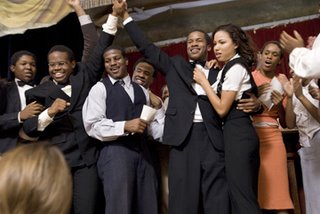
The one saving grace that lifts the film up from being completely forgettable is that the movie does know how to pull the proper heartstrings when it is needed. The competition scenes may be somewhat predictable, but they are still exciting to watch, and they don't fall back on forced manipulation and feelings.
The Great Debaters wants so desperately to be a spirit-lifting crowd pleaser, and it would have succeeded with me if it had just dug deeper into its characters. If the scenes of the characters struggling to win the debate tournament were effective in its present state, imagine how much more effective they would have been had the characters and their relationships been given more of a chance to take center stage.
The Great Debaters is passable, but not much more than that.
0 comments
 If The Great Debaters did not entirely click with me, it's certainly not for a lack of trying. Making his second directorial effort after 2001's Antwone Fisher, Denzel Washington certainly shows that he knows how to shoot a beautiful picture and get some wonderful performances out of his cast. The story, though somewhat overly worn and cliche, is also undeniably effective, and even moving at times. The only thing holding the film back is that despite holding a fairly generous run time of just over two hours, the story frequently seems rushed, and the characters not quite as alive as they could and should be. This is a movie filled with many wonderful scenes and moments that stick out surrounded by a bunch of scenes that either aren't developed enough, or just don't have the strength to stand out.
If The Great Debaters did not entirely click with me, it's certainly not for a lack of trying. Making his second directorial effort after 2001's Antwone Fisher, Denzel Washington certainly shows that he knows how to shoot a beautiful picture and get some wonderful performances out of his cast. The story, though somewhat overly worn and cliche, is also undeniably effective, and even moving at times. The only thing holding the film back is that despite holding a fairly generous run time of just over two hours, the story frequently seems rushed, and the characters not quite as alive as they could and should be. This is a movie filled with many wonderful scenes and moments that stick out surrounded by a bunch of scenes that either aren't developed enough, or just don't have the strength to stand out. Inspired by a true story and set in the racially-charged South in 1935, the film follows a stern yet understanding college professor named Melvin Tolson (Denzel Washington) who led three of his bright young students at Wiley College into history as the first African American college debate team to compete against one of the top schools in the country. The students who broke down the borders of race include the strong-willed Samantha Booke (Jurnee Smollett), team leader Henry Lowe (Nate Parker), and the youngest student on the campus, 14-year-old James Farmer, Jr (Denzel Whitaker). As they make their way through the debate tournament mostly undefeated, the students will come face-to-face with racial prejudice, and their own personal demons, such as Henry's addiction to alcohol and women, and James feeling like he's not respected on the team due to the fact he's so much younger than everyone else. There's also talk that Professor Tolson is in trouble with the local law, and that it may jeopardize the team's future, which many people including James Farmer's father (Forest Whitaker) are concerned about. It goes without saying that the movie climaxes with a big debate tournament, as the three students go up against Harvard University in a historical match.
Inspired by a true story and set in the racially-charged South in 1935, the film follows a stern yet understanding college professor named Melvin Tolson (Denzel Washington) who led three of his bright young students at Wiley College into history as the first African American college debate team to compete against one of the top schools in the country. The students who broke down the borders of race include the strong-willed Samantha Booke (Jurnee Smollett), team leader Henry Lowe (Nate Parker), and the youngest student on the campus, 14-year-old James Farmer, Jr (Denzel Whitaker). As they make their way through the debate tournament mostly undefeated, the students will come face-to-face with racial prejudice, and their own personal demons, such as Henry's addiction to alcohol and women, and James feeling like he's not respected on the team due to the fact he's so much younger than everyone else. There's also talk that Professor Tolson is in trouble with the local law, and that it may jeopardize the team's future, which many people including James Farmer's father (Forest Whitaker) are concerned about. It goes without saying that the movie climaxes with a big debate tournament, as the three students go up against Harvard University in a historical match. In bringing the story of the Wiley College debate team to the big screen, director Washington and screenwriter Robert Eisele have changed some major facts, most notably the fact that the historical match that concludes the film was not against Harvard but a completely different school. Nonetheless, The Great Debaters knows what its doing when it comes to being uplifting, inspirational entertainment for the most part. All three of the young actors who play the students on the debate team handle their roles effortlessly, particularly Denzel Whitaker (no relation to actor Forest Whitaker, who plays his father) as the youngest member of the team. This is the first I've noticed him in a film, though he has already racked up some credits. As the son of a local preacher who is forced to hide his feelings for debate teammate Samantha due to the age difference between them, his character has the most emotional story arc of the main characters, and his performance is immediately likable and easy to relate to. His fellow students get their own subplots, such as the shaky relationship that slowly develops between Henry and Samantha, and Henry battling his own personal demons. However, neither of these get quite as much screen time as young Whitaker's character, and so he is able to almost single-handedly walk away with the entire film.
In bringing the story of the Wiley College debate team to the big screen, director Washington and screenwriter Robert Eisele have changed some major facts, most notably the fact that the historical match that concludes the film was not against Harvard but a completely different school. Nonetheless, The Great Debaters knows what its doing when it comes to being uplifting, inspirational entertainment for the most part. All three of the young actors who play the students on the debate team handle their roles effortlessly, particularly Denzel Whitaker (no relation to actor Forest Whitaker, who plays his father) as the youngest member of the team. This is the first I've noticed him in a film, though he has already racked up some credits. As the son of a local preacher who is forced to hide his feelings for debate teammate Samantha due to the age difference between them, his character has the most emotional story arc of the main characters, and his performance is immediately likable and easy to relate to. His fellow students get their own subplots, such as the shaky relationship that slowly develops between Henry and Samantha, and Henry battling his own personal demons. However, neither of these get quite as much screen time as young Whitaker's character, and so he is able to almost single-handedly walk away with the entire film. That right there leads me to my major concern with the film. The movie has been made with obvious care, holds great performances, and has a number of memorable scenes tied into the racial tensions of the time, such as when Tolson and the students come upon a lynch mob while driving late one night, or when young Whitaker and his family run afoul of some pig farmers. The memorable moments stand out, but seem strangely out of place with the rest of the movie. The reason is mainly because the rest of the movie is so pedestrian and by the book that it's hard to get excited about almost everything else that happens during the course of the film. It's not just the fact that we've seen it all before in numerous other films. The film keeps us at a continuous distance, never letting us get as close as we want to. Professor Tolson almost seems to come across as an afterthought, as he has very little interaction with the students during the course of the film, and never quite comes across as a source of inspiration like he should. The students' debate career is mostly handled with montages or off camera. One of the most frustrating and oddest choices of the film is when James Farmer, Jr nervously takes the debate stand for the first time, and supposedly leads to the team's first loss. We don't get to see this, however, which kind of seems like a cheat. It also somewhat lessens the climax, when young Farmer is forced to take the stand again.
That right there leads me to my major concern with the film. The movie has been made with obvious care, holds great performances, and has a number of memorable scenes tied into the racial tensions of the time, such as when Tolson and the students come upon a lynch mob while driving late one night, or when young Whitaker and his family run afoul of some pig farmers. The memorable moments stand out, but seem strangely out of place with the rest of the movie. The reason is mainly because the rest of the movie is so pedestrian and by the book that it's hard to get excited about almost everything else that happens during the course of the film. It's not just the fact that we've seen it all before in numerous other films. The film keeps us at a continuous distance, never letting us get as close as we want to. Professor Tolson almost seems to come across as an afterthought, as he has very little interaction with the students during the course of the film, and never quite comes across as a source of inspiration like he should. The students' debate career is mostly handled with montages or off camera. One of the most frustrating and oddest choices of the film is when James Farmer, Jr nervously takes the debate stand for the first time, and supposedly leads to the team's first loss. We don't get to see this, however, which kind of seems like a cheat. It also somewhat lessens the climax, when young Farmer is forced to take the stand again. Perhaps what is more frustrating is The Great Debaters' inability to resolve even its major story arcs. The love triangle between the three students never quite seems to get resolved to any reasonable degree. The scene we expect the characters to sit down and talk it out never comes, and the subplot really is just left hanging when the end credits appear. I find this curious, since this is a major cause of friction within the team, and to have it completely dropped is quite sloppy on the part of the screenplay. The characters seem to come together as a team at the end almost for no reason at all. Professor Tolson's subplot seems to come and go, almost like the character himself. He disappears for long periods of time as the movie decides to focus solely on the students, then comes back, almost as if to remind us he's in the movie also. There's something very wrong with an inspirational teacher movie when the teacher comes across as such a minor character. His lessons and wisdoms that he imparts to his students come scattered throughout the film, but it almost comes across as if the students did everything by themselves, and that their legendary year was the result of solely them. This is most likely because Washington wanted the movie to focus on the young actors instead of him, but at the same time, he should have given his character a somewhat heavier presence in the overall film.
Perhaps what is more frustrating is The Great Debaters' inability to resolve even its major story arcs. The love triangle between the three students never quite seems to get resolved to any reasonable degree. The scene we expect the characters to sit down and talk it out never comes, and the subplot really is just left hanging when the end credits appear. I find this curious, since this is a major cause of friction within the team, and to have it completely dropped is quite sloppy on the part of the screenplay. The characters seem to come together as a team at the end almost for no reason at all. Professor Tolson's subplot seems to come and go, almost like the character himself. He disappears for long periods of time as the movie decides to focus solely on the students, then comes back, almost as if to remind us he's in the movie also. There's something very wrong with an inspirational teacher movie when the teacher comes across as such a minor character. His lessons and wisdoms that he imparts to his students come scattered throughout the film, but it almost comes across as if the students did everything by themselves, and that their legendary year was the result of solely them. This is most likely because Washington wanted the movie to focus on the young actors instead of him, but at the same time, he should have given his character a somewhat heavier presence in the overall film. The one saving grace that lifts the film up from being completely forgettable is that the movie does know how to pull the proper heartstrings when it is needed. The competition scenes may be somewhat predictable, but they are still exciting to watch, and they don't fall back on forced manipulation and feelings. The Great Debaters wants so desperately to be a spirit-lifting crowd pleaser, and it would have succeeded with me if it had just dug deeper into its characters. If the scenes of the characters struggling to win the debate tournament were effective in its present state, imagine how much more effective they would have been had the characters and their relationships been given more of a chance to take center stage. The Great Debaters is passable, but not much more than that.
The one saving grace that lifts the film up from being completely forgettable is that the movie does know how to pull the proper heartstrings when it is needed. The competition scenes may be somewhat predictable, but they are still exciting to watch, and they don't fall back on forced manipulation and feelings. The Great Debaters wants so desperately to be a spirit-lifting crowd pleaser, and it would have succeeded with me if it had just dug deeper into its characters. If the scenes of the characters struggling to win the debate tournament were effective in its present state, imagine how much more effective they would have been had the characters and their relationships been given more of a chance to take center stage. The Great Debaters is passable, but not much more than that.






0 Comments:
Post a Comment
<< Home